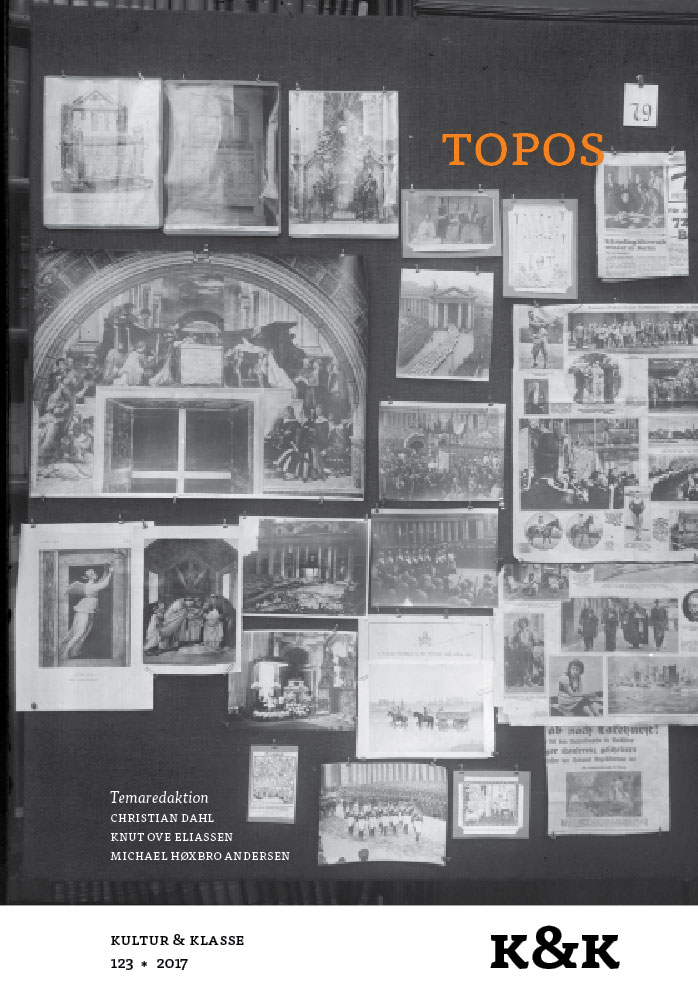Topologisk poetik i Viktor Šklovskijs Prosateorien
DOI:
https://doi.org/10.7146/kok.v45i123.96829Nøgleord:
automatisering, fremmedgørelse, litteraritet, konventionalitet, formalisme, litteraturfilosofi, greb, revitaliseringResumé
Though not explicitly addressed as such, the literary topos plays a crucial role in Russian literary theorist Victor Shklovsky’s Theory of Prose (1925). On the backdrop of a critical discussion of the ‘symbolist’ conception of literature and of the ‘ethnographical school’s’ exploration of literary motifs, Shklovsky here presents what can be understood as a genuine topological poetics: A poetics bent on the ‘formulaic’ as quintessential literary device. Rather than a figuration of the author’s ideas literary images are, according to Shklovsky, conventional formulas that circulate in language. Rather than collective commemorations of original customs literary motifs exhibit literature’s revitalization of ‘automatized’ language. Thus redefined as topoi in this most basic sense – as commonplaces or repetitions of existing forms – literary images and motifs become key to understanding ‘literariness’ itself as a redeeming ‘estrangement’ of dead language forms and to conceptualizing literary history as a chain of successive estrangements. Qualifying the topos as self-referential, estranging device, Theory of Prose thus presents an original if also thought-provoking contribution to topology. However, it ultimately rest on a today questionable literary philosophical premise: The idea of literature as a privileged discursive space where the lost ideality of the life-world is recreated.
Referencer
Curtius, Ernst Robert. Europäische Literatur und Latinisches Mittelalter. Bern: Francke, 1954 (1948).
Eagleton, Terry. Literary Theory: An Introduction. Cambridge: Blackwell, 1996.
Ehrlich, Victor. Russian Formalism. History-Doctrine. The Hague/Paris: Mouton, 1969.
Gelley, Alexander. “Ernst Robert Curtius: Topology and Critical Method”. MLN 81.5, 1966, 579-94.
Gumbrecht, Hans Ulrich. In 1926. Living on the Edge of Time. Cambridge MA: Harvard University Press, 1997.
Jameson, Fredric. The Prison-House of Language: A Critical Account of Structuralism and Russian Formalism. New Jersey: Princeton University Press, 1972.
Kluge, Sofie. Don Quixote og romangenren. København: Museum Tusculanums Forlag, 2006.
Ordbog over det danske sprog. Online udgave: http://ordnet.dk/ods. Set 12. november 2016.
Readings in Russian Poetics, eds. L. Matejka & K. Pomorska. Cambridge: MIT Press, 1971.
Robinson, Douglas. Estrangement and the Somatics of Literature: Tolstoy, Shklovsky, Brecht. Baltimore: John Hopkins University Press, 2008.
Russian Formalism. A Retrospective Glance, eds. R. L. Jackson & S. Rudy. New Haven: Yale UP, 1985.
Šklovskij, Viktor. Theorie der Prosa, übersetzt von Gisela Drohla. Frankfurt am Main, Fischer Verlag, 1984.
Shklovsky, Victor. Theory of Prose, translated by B. Sher with an Introduction by G. L. Bruns. Parkwood Elms: Dalkey Archive Press, 1990.
Steiner, Peter. Russian Formalism. A Metapoetics. Ithaca/London: Cornell University Press, 1984.
Striedter, Jurij., ed., Russischer Formalismus. Texte. München: W. Fink, 1988.
Théorie de la littérature. Textes des formalistes russes réunis, présentés et traduits par Tzvetan Todorov. Préface de Roman Jakobson. Paris: Éditions du Seuil, 1965.
Thompson, Ewa. Russian Formalism and Anglo-American New Criticism. The Hague: De Gruyter Mouton, 1971.
Todorov, Tzvetan. “Some Approaches to Russian Formalism”. Russian Formalism. A Collection of Articles and Texts in Translation, eds. S. Bann & J. E. Bowlt. Edinburgh: Scottish Academic Press, 1973, 6-10.
Todorov, Tzvetan. Literature and its Theorists: a Personal View of Twentieth-Century Criticism. London: Routledge & Kegan Paul, 1987.
Downloads
Publiceret
Citation/Eksport
Nummer
Sektion
Licens
Tidsskriftet følger dansk ophavsret.





